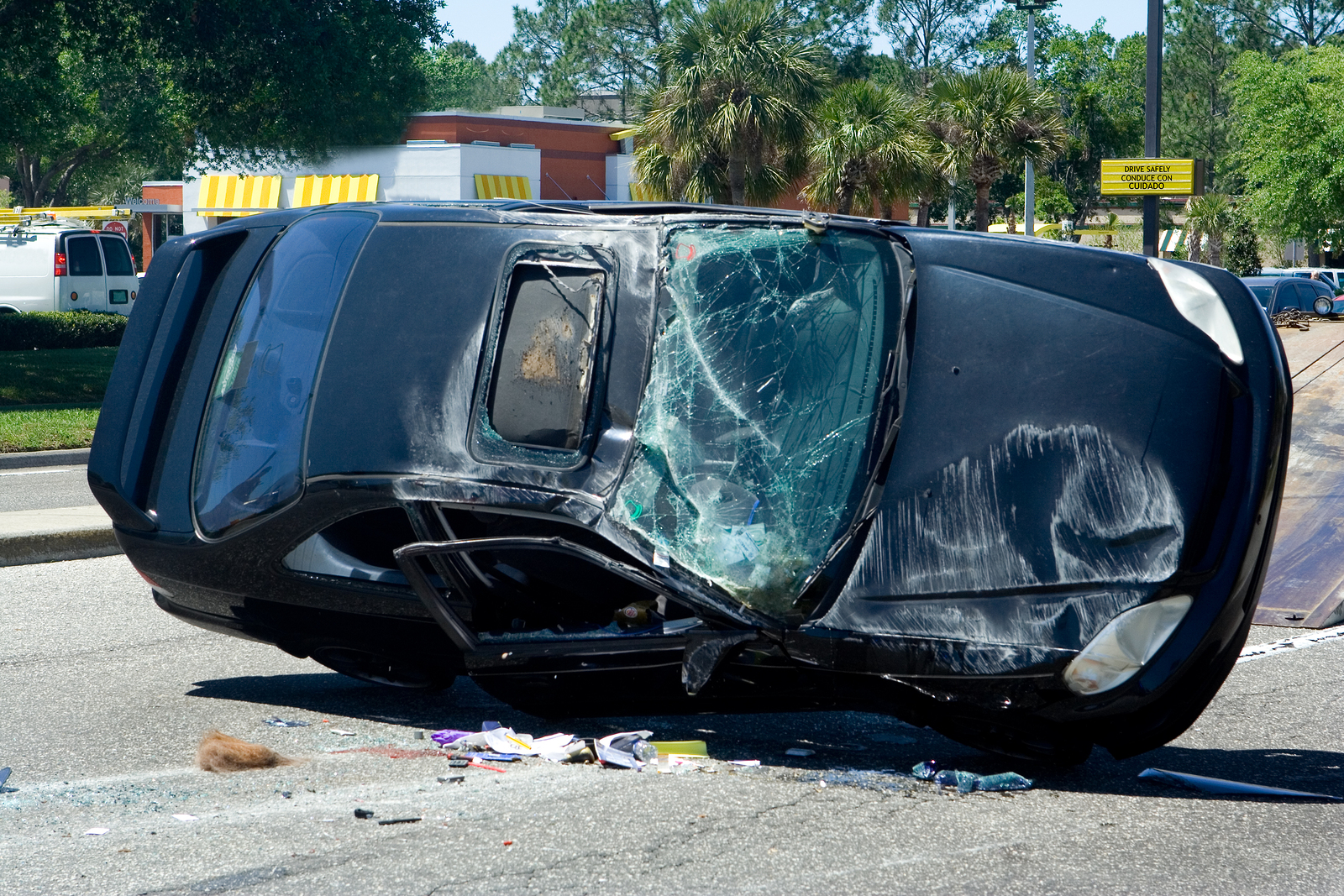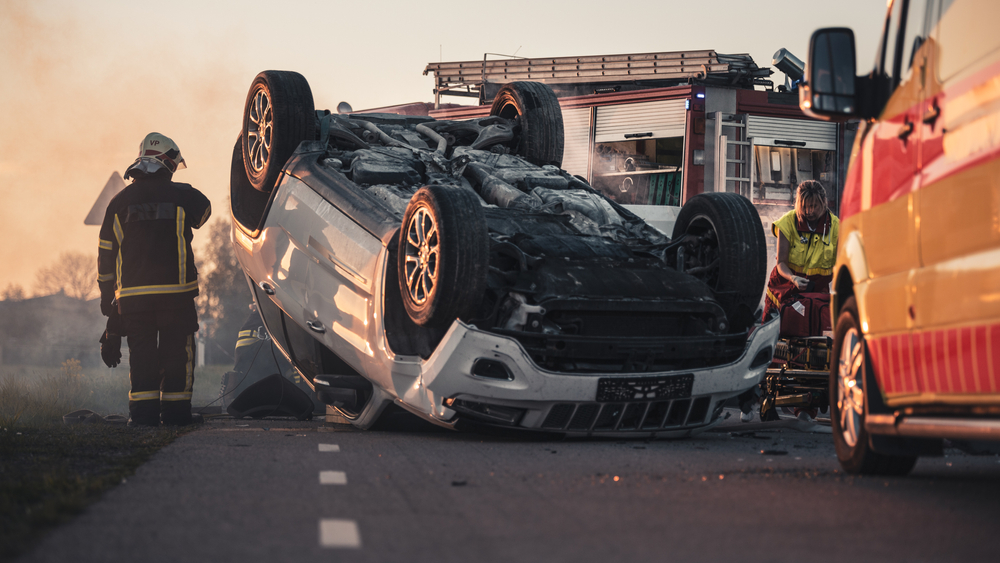Rollover accidents are an especially dangerous form of vehicle crash. By definition, a rollover accident happens when a vehicle tips or flips onto its roof or side, and some vehicles might even roll several times. While any type of vehicle can roll over, some, such as large trucks, vans, or SUVs, are more prone to this type of accident.
A rollover might involve one vehicle, leading a driver to believe they have few legal options for financial recovery. However, many of these accidents happen because of a pre-rollover factor, and often, this is because of another person’s negligence.
If you suffered injuries in a rollover and believe someone else was at fault, consult a car accident lawyer near you as soon as possible about your rights.
Vehicles Most Likely to Experience a Rollover Accident
While smaller vehicles can sustain more damage in a rollover, larger vehicles are more likely to roll in the first place. A higher center of gravity and narrower wheelbase make a vehicle top-heavy and at greater risk of rollovers. The most likely vehicles to be involved in a rollover incident include:
- Semi-trucks
- Buses
- Pickup trucks
- 15-passenger vans
- Tall SUVs
Although newer designs are less prone to this issue, the risks are still there for many motorists and truck drivers. Reports show that rollover accidents are the most dangerous form of vehicle accidents, as they result in more fatalities per crash than any other type.
Statistically speaking, you are twice as likely to die in a rollover crash than in any other vehicle accident. Therefore, understanding the implications of rollover crashes and what to do following an accident is important.
Knowing one’s rights after a rollover accident is also essential. If another person’s negligence caused the crash, a car accident lawyer can seek proper compensation for your injuries and losses.
What Will a Car Accident Attorney Do For Me?
There are many ways a car accident attorney can benefit you once you hire them as your legal representative. They will conduct their own investigation of the accident, finding evidence to prove the other party’s liability.

Evaluating Your Case
Your car accident lawyer will assess all the details of your claim, ensuring that every base is covered. Establishing fault is only one step on the journey to compensation, and your attorney will know how to thoroughly prepare and file a persuasive claim.
Gathering Evidence
A rollover lawyer has the experience to build your case, gathering all the right evidence toward winning a fair settlement. They may use medical records, expert testimony, or witness accounts to help your claim or might even revisit the site of the accident to gather more evidence of liability.
Negotiating with Insurance Companies
Dealing with experienced, hard-nosed insurance company adjusters is a stressful business. Having an experienced car accident attorney on your side takes this pressure off your shoulders.
Representing You in Litigation
You may file a personal injury lawsuit in civil court when the defendant’s insurance company doesn’t pay the full amount you deserve. While your car accident lawyer will do everything possible to reach a fair out-of-court settlement, insurers may leave no choice but to file a lawsuit.
The Most Common Injuries Sustained in Rollover Accidents
The likelihood of sustaining injuries in a rollover is very high, and these injuries can often be catastrophic. The following injuries are common in a rollover accident:
Spinal Cord Injuries
Such a heavy force can be enough to cause spinal problems for any victim, resulting in months or years of recovery time. At the very worst end of the scale is total paralysis, which is completely life-changing.
Head Injuries
Head and traumatic brain injuries (TBIs) are common in a rollover accident, as occupants often suffer direct head trauma as the vehicle rolls. Any type of TBI may present serious symptoms, such as cognitive impairments, confusion, or mood changes.
Broken Bones
Rollover accidents are so forceful that they can easily cause broken bones. At high speeds, even the most robust-looking vehicle is no match for Newton’s first law of motion. Fractures often take months to heal, and some might require emergency surgery.
Lacerations
Cuts and deep gashes requiring sutures are all common in a rollover accident. Soft tissue, tendons, and muscles are especially vulnerable to lacerations and tears in a rollover accident.
Amputation
As horrific as it sounds, amputation is possible following a rollover accident. In very unfortunate cases, a victim may lose a limb after doctors have no other choice due to a severe crush injury or severance of an extremity.
Internal Bleeding
Our organs and arteries are vulnerable to blunt force trauma in high-impact rollover accidents. Significant internal organ damage or hemorrhaging may present tough, life-long problems for a victim.
Types of Rollover Accidents
There are two different types of rollover accidents: tripped and untripped. Each one can help determine what unfolds in a liability claim.

Untripped Rollover Accidents
If a driver attempts high-speed maneuvers like cornering, overtaking, or evasive driving, it might result in a rollover accident. These collisions are usually the result of extreme negligence and can cause injuries to passengers in the vehicle or others in the vicinity.
Sometimes, another driver will cause your vehicle to have an untripped rollover. They might come into your lane, causing you to overcorrect and lose control. They might run you off the road, causing your vehicle to roll down an embankment. In these situations, your car might be the only one to crash, but it does not mean you were to blame.
Tripped Rollover Accidents
When a car leaves a roadway and slides sideways when its tires catch the soft ground or the curb, it is a tripped accident. In addition, the vehicle may collide with another car, forcing it into a rollover.
Tripped accidents might include:
- Guardrail - As a motorist travels in one direction down a two-lane highway at high speed, it may veer into the guardrail on the right side. This action can result in the left front portion of the car riding the rail like a ramp, flipping it onto its side or roof. Worse still, it may send the car airborne before the rollover.
- Soft Soil - In the same two-lane highway scenario, the vehicle can go off the right side onto soft soil, which prompts the driver to take evasive action. If the driver tries to steer hard left as a countermeasure, it forces the vehicle to catch the ground, sending it into a roll. At high speeds, this can be particularly deadly.
- Curb - Sometimes, a car or truck’s tire might hit a curb while traveling at high speeds, which can cause the tire to fly into the air, and the whole vehicle can flip and roll.
In any of these scenarios, you may be entitled to compensation if the rollover accident was due to someone else’s negligence. If you have been in a crash, don’t hesitate to contact a car accident attorney to evaluate your rights.
Other Forms of Rollover Accidents
There are other types of rollovers, including:
- Flip-over accidents, when the car flips onto its side or roof, usually through a collision with another driver.
- Trip-over accidents, when something suddenly stops a vehicle in its tracks, causing the inertia to send it airborne. It isn’t always another vehicle that causes a trip-over accident — sometimes, inanimate objects like potholes are the reason.
- Fall-over accidents, when a vehicle falls down or over an embankment.
- Multi-vehicle collisions, when the force of a collision’s impact may send more than one vehicle into a roll.
Causes of Rollover Accidents
There are always many risks on the road, and drivers can make many errors that lead to crashes. Certain factors, including the following, typically influence rollover accidents.
Distracted Driving
Unfortunately, modern driving involves many distractions, including cell phones, GPS, drive-thru food and beverages, and passengers. Distracted driving is responsible for many rollover accidents.
Aggressive Driving
There are drivers out there who are impatient and struggle to control their emotions behind the wheel. These dangerous drivers might engage in maneuvers like tailgating, weaving through lanes, or excessive speeding. Another trend emerging is drag-racing in public spaces, putting other innocent motorists and pedestrians in severe danger.
Impaired Driving
Alcohol and drugs, including prescription drugs, can impair drivers and cause them to make unsafe decisions on the road. Many impaired drivers might change lanes without checking for other vehicles, fail to yield, or make other mistakes that cause you to overcorrect, swerve, or otherwise lose control of your car, causing it to roll over.
Speeding
Speeding is a top cause of rollovers. Sometimes, another speeding driver might run your car off the road. Other times, you might be a passenger in a vehicle with a speeding driver that rolls over as a result. In either situation, speeding can lead drivers to lose control, often causing wheels to leave the road and the car to flip over.
Equipment Failures
Sometimes, a vehicle manufacturer is liable if their product is defective. Improperly constructed tires might prematurely blow out, leading to a rollover. Some cars, SUVs, or trucks may contain hidden design or manufacturing flaws that cause rollovers. For example, many lawsuits have focused on the design of 15-passenger vans that are too prone to rolling over.
Poorly Loaded Vehicles
Without proper loading, semi-trucks and other vehicles carrying heavy loads can be at a higher risk of rollovers. A truck with too much cargo runs the risk of falling over, endangering other road users. Often, an overloaded truck can flip over, crushing or damaging other vehicles.
Truck drivers or their loading crews have a duty of care to secure their load safely; otherwise, they should be liable for any damage caused in a rollover.
Road Conditions
Some rollover accidents happen because of adverse weather conditions, such as ice, fog, or heavy rain. Specifically, rollovers occur when drivers fail to slow down adequately to account for dangerous weather, slippery roads, and other conditions. For instance, a semi-truck driver might not slow down in windy conditions, and high winds might blow the trailer over and cause the truck to flip and collide with other vehicles.
Why a Car Accident Lawyer is Right For You
If you or a loved one has been the victim of a rollover accident, you may be eligible for a significant financial settlement. Once your attorney identifies liable parties, they can build a strong case against the liable driver and present this evidence with your insurance claim.
Beyond proving liability, you must understand what damages you deserve when trying to recover from devastating losses. Your car accident attorney can examine your losses, which might include:
- Past and future medical expenses
- Past and future lost income
- Pain and suffering
After seeing medical treatment, your next step should always be to consult a car accident attorney who will evaluate your case. They can advise you what to expect, so you can gain some immediate peace of mind regarding your losses and financial future.
Why You Should Never Delay in Seeking a Car Accident Lawyer
In the aftermath of a car accident, it may seem overwhelming to consider taking legal action. However, it is important to never delay in seeking the advice of a car accident lawyer.

First and foremost, there are key deadlines for car accident cases. While insurance companies might not have deadlines for claims, state law sets out statutes of limitations for injury lawsuits. If you lose your right to file a lawsuit, it will also greatly affect your ability to obtain compensation through an insurance claim. You cannot risk missing this deadline.
Additionally, evidence can quickly fade or get lost or damaged with time. The sooner your attorney is working on your case, the better they can preserve critical evidence to prove liability. This is especially true in truck rollover cases.
Remember, time is of the essence when seeking legal assistance after a rollover accident. Delays can result in lost evidence, missed filing deadlines, and compromised settlements. Don't hesitate to consult a car accident lawyer who can guide you through the process and fight for the compensation you deserve.
